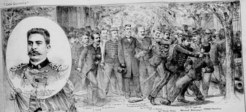Within the law: criminal law and political repression in Brazil (1889–1930)
Completed Project
In Brazil, the so-called 'First Republic' (1889–1930) is commonly identified by historians as one of the most turbulent periods in the country’s national history. In addition to the implementation of a new model of government by a military coup (Presidential Constitutional Republic, replacing the previous Parliamentary Constitutional Monarchy, active from 1822 to late 1889), the country went through an ambitious and violent process of institutional and social modernisation, aiming to 'raise' Brazil to the same level as European 'civilized nations', which resulted in a massive wave of social segregation. Adding the abolition of slavery in 1888, and the incentive to host immigration flows coming from all over the world, Brazil also faced an intense transformation in its social and population standards. With that, the perfect ingredients for several types of social upheaval were on the table. A new government, managed by new institutions, intended to control a new population: one can deduce that this multiplicity of structural changes brought plenty of elements for the emergence of multiple political conflicts that would shake the harmonious image forged by the official discourses.

Even though by that time Brazil did not have many emergency laws explicitly aimed at curbing political deviance, a number of legal ‘alternatives’ (administrative and police measures) were nevertheless applied in this context, and are widely attested to by the national historiography. Several historians and lawyers conducting researches on this argument paid close attention to administrative and police measures, like extradition, deportation, arrest warrants and investigations in a broad sense. However, very little is said about how judges were applying existent criminal law to condemn or to absolve people being formally prosecuted by acts related to those conflicts.
My PhD thesis explored precisely this gap. I interpreted the notion of 'criminalisation' in a more strict sense and investigated under what circumstances ordinary criminal law - and not police or administrative law – was triggered as a legal response to certain political conflicts. Moreover, I was interested in distinguishing which of these conflicts came to the appreciation of the judiciary, and how the parties involved appropriated and disputed the interpretation of legal devices, doctrinal concepts, procedural resources and moral arguments in search of the satisfaction of their interests.
My conclusion was that, in practice, ordinary criminal law and its 'due process' did not remain isolated from the repression of political conflicts nor were they exclusively applied to a specific group of individuals. They were, on the contrary, useful tools for the preservation of an exclusionary and exceptional legal order such as the one structured in the First Republic.
The dissertation was defended in December 2020 and received the grade “summa cum laude”. In 2021, it was awarded the Otto Hahn Medal for outstanding scientific achievement. The publication of the dissertation as a book in the Global Perspectives on Legal History Series is due in 2024.
